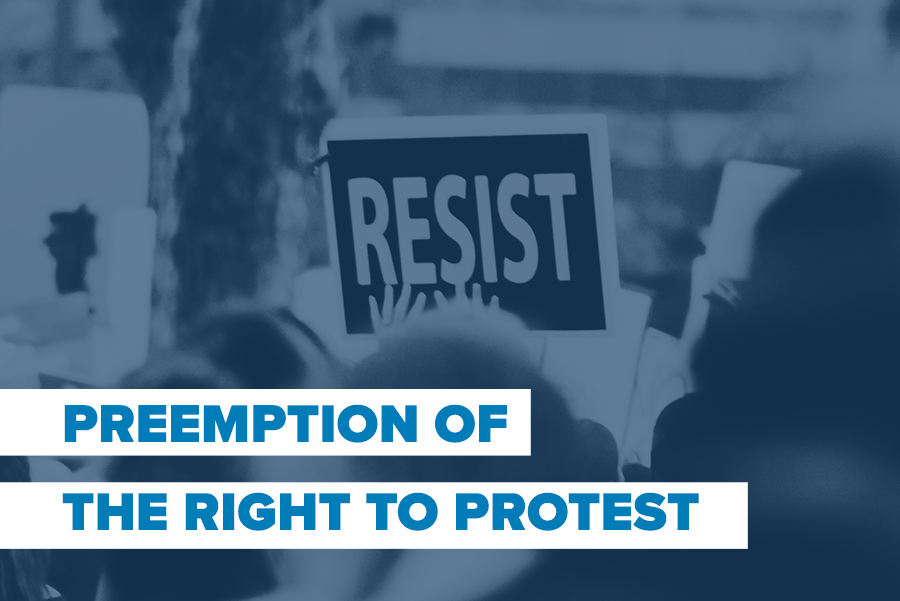
Resources About Racial Justice
Featured Resources About Racial Justice
A new report, Preempting Progress, examines how state interference in local policymaking prevents people of color, women, and low-income workers from making ends meet in the South.
In the wake of recent demonstrations against racist police and vigilante violence against Black communities, we will likely see increased legislative attacks on protestors.
Increasingly, corporations and right-wing state legislators are successfully driving preemption bills that make it harder for women and women of color in particular to work with their local governments to build communities that work for them and their families.
All Resources About Racial Justice
The fourth edition of The Local Power & Politics Review explores how abusive preemption legislation has permeated so many areas of American policy. The new edition covers a wide range of issue areas – from abortion access to local environmental action to LGBTQ+ equality to prosecutorial discretion.
A new white paper from Local Progress and Local Solutions Support Center (LSSC), Driving Toward Equitable Traffic Enforcement, offers local advocates and policymakers a roadmap for advancing traffic safety policies that promote driving equity - while highlighting preemption-related concerns to keep in mind.
This paper is a brief update to our earlier white paper, “Preempting Progress: States Take Aim at Local Prosecutors,” cataloging attempts to curtail the discretion of local prosecutors. In this update, we also address successful efforts to push back against the efforts to strip power from local prosecutors and the communities that elected them.
“State takeovers of public schools and districts is one prong of a multi-prong approach to dismantling resistance to oppressive legislation,” Steven L. Nelson, Ph.D. writes.
The third edition of The Local Power & Politics Review features a series of articles that explore how abusive preemption legislation has impacted states across the country. The new edition covers a wide range of issue areas – from public health policy to local environmental action to public schools to public safety to elections.
In a new paper from Local Solutions Support Center, Curricular Preemption: The New Front of an Old Culture War, we discuss the growing trend of curricular preemption and its impact on local school districts.
Preempting Progress: States Take Aim at Local Prosecutors examines how as local communities have called on prosecutors to use their discretion to embrace reform and a less carceral approach to criminal justice, states have intervened in an attempt to force prosecutors to continue tough-on-crime policies.
Recently, we’ve seen a number of state legislatures attempt to take control of local budget decisions and processes – particularly as it relates to local control of police budgets.
A new raft of bills criminalizes many types of protests and threaten localities that fail to respond according to state dictates.
Efforts to ban classes that explore the ways in which a history of inequality and racism in the U.S. continue to affect American institutions and society today set a dangerous precedent for state interference in local classrooms.
It’s time for state lawmakers to acknowledge the fundamental need to increase access to strong, reliable and affordable broadband.
This polling from the African-American Research Collaborative found that it is most helpful to engage voters through a policy position and then transition to a discussion of how to influence state government to make positive change.
A new white paper from LSSC explores in more detail how some state legislatures are using preemption to undermine local control of police budgeting, accountability, and management.
This new report highlights how state lawmakers in the Midwest have abused preemption to impede progress on a variety of issues that would improve the economic security and well-being of residents.
In this resource, we examine how, as the Black Lives Matter movement strengthens nationwide and communities push for critical changes to confront racism, preemption has once again emerged as a tool to stifle important local efforts.
As the definition of “public health” expands, so could the ability of public health agencies and officials to address the SDOH and combat a greater variety of public ills.
A new report, Preempting Progress, examines how state interference in local policymaking prevents people of color, women, and low-income workers from making ends meet in the South.
In the wake of recent demonstrations against racist police and vigilante violence against Black communities, we will likely see increased legislative attacks on protestors.
Preemption of municipal broadband is complicated – even states that have a concise statute to bar telecommunications services are complicated by questions about whether the definition of such services includes broadband.
This guide highlights the scale of the broadband problem (before and during the pandemic) and important policies that local governments can consider in the short and long-term to increase access to broadband.
This July 2020 amicus brief in the case ‘Iowa Association of Business & Industry v. City of Waterloo’ deals with preemption of local “Ban the Box” policies.
This model resolution is geared towards helping local officials and advocates push their legislature and governor to clarify local authority pertaining to key policies around housing, worker protection, and broadband access.
As part of the Local Solutions Support Center’s ongoing efforts to help local leaders understand and deploy their authority to address their communities’ needs, we have produced this memo outlining legal possibilities and prohibitions.
As the coronavirus pandemic spreads, local elected officials and advocates alike are asking what they can do for their communities across a range of policies — including to ensure that everyone has broadband Internet access available.
The unfortunate result of this burgeoning legislative movement to adopt statue statutes and other punitive preemption measures has been the erosion of local democracy, the stifling of local political innovation, and the undermining of local faith in the democratic process.
Increasingly, corporations and right-wing state legislators are successfully driving preemption bills that make it harder for women and women of color in particular to work with their local governments to build communities that work for them and their families.


























